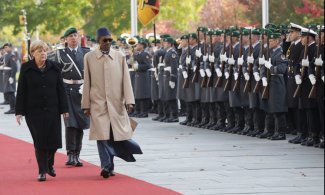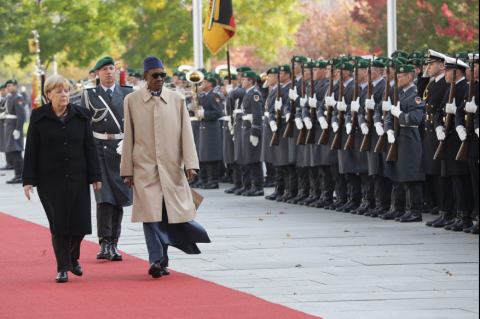
For almost two weeks since herdsmen overran some villages in the predominantly Christian district of Kaduna State and slaughtered scores of Nigerians, President Buhari maintained a decided silence.
After what seemed like eternity, President Muhammadu Buhari, on Thursday, 5th January, 2017, caused to be issued, on his behalf, a public reaction to the Southern Kaduna killings of Christmas eve and Christmas day. The wait wasn’t worth it, to say the least. The resultant statement proved an object lesson in too-little-too-late response to a national tragedy.
For almost two weeks since herdsmen overran some villages in the predominantly Christian district of Kaduna State and slaughtered scores of Nigerians, President Buhari maintained a decided silence. A curious silence. A dubious silence that interrogated itself with an exclamation!
Throughout that period, Buhari remained ensconced in the bubble of his privileges, refusing to sacrifice his convenience for the emergency call to function as comforter in chief. Against the demands of the disaster, he acted indifferent, absent-minded, and otherworldly. He withheld words of comfort from the bereaved, condemnation from the perpetrators, and assurance from the nation.
As it started to become clear that he was unwillingly to address the carnage and its overarching cause, individuals, groups, and newspaper editorials united into a desperate rescue operation to save him from the ugly optics of his embarrassing unconcern. They begged, cajoled and criticized him for appearing to derogate from his responsibility to give Nigerians a sense of security.
But he held out, adamantly refusing to be shamed or pressured into willing himself to perform even the least tasking to-fulfill-all-righteousness show of outrage and empathy. Instead of grudging a slight act in dissembling, by way of offering a perfunctory helping of compassion, at least to soothe the psyche of the traumatized collective, Buhari deemed it more appropriate to unleash his officials to rationalize his indifference.
He had his spokesman, Femi Adesina, go on national television to defend the silence. He had the Inspector General of Police call the Christian community’s estimate of the death toll exaggerated. And he had his minister of interior, the elitist shine-my-shoe egomaniac, malign the grieving and victimized Christian community as pretentious mourners "fanning the embers of hate."
Buhari’s belated capitulation, through spokesman Garba Shehu’s tepid written statement, two weeks after the president’s other spokesman, Adesina, had told the whole world that the Nigerian president was too busy to volunteer a quote on the massacre of Nigerians under his watch, was a matter of expediency. And Nigerians know it. They know the lust for power –not humanity or duty –made him do it.
The second term hopeful budged after he sensed, from the groundswell of denouncement of his silence, that his posture might be weaponized by his rivals in the next election.
On 19th December, 2016, a young man later identified as a 26-year-old Tunisian migrant intentionally drove a truck into a Christmas market in Berlin and killed 12 people and injured 56. President Buhari condemned the attack four days after the incident. He struck the right tone in commiserating with the head of the government of Germany.
"Buhari stated that the incident was a wake-up call for the rest of the world to show sympathy and solidarity toward Chancellor Angela Merkel of Germany in the global effort to neutralize and obliterate terrorists’ agenda against humanity.
"The Nigerian leader also extolled Merkel’s strong leadership qualities’’ and ‘’appreciated the Chancellor’s support for Nigeria in dealing with its own domestic challenges, including terrorism.’’
But four days later when Nigeria experienced a disproportionately worse terrorist attack in Southern Kaduna, the President Buhari who hurried to export charity to Germany, clammed up and waited to see if he could sit out the mourning in his homeland without expending a word.
And while he readily chimed in with the characterization of the killing of ‘only’ 12 people in Merkel's Germany as a terrorist act, when he eventually brought himself to comment on the killing of multiples of a dozen human beings in his native Nigeria, he euphemised the terrorist massacre as ‘’violence’’. He declined to call it what it was, though it had all the markings of terrorism.
Fulani herdsmen, in recent times, have made the deaths of innocents a price Nigerians must continue to pay for beef. They have been destroying Nigerian lives like missionary mercenaries, killing from village to village. And they have been growing in brutality year by year. By the last count, they have killed 4000 Nigerians.
The herdsmen’s bloody attack on Southern Kaduna killings is a subplot of a metastasizing terrorist scheme. It is part of their bold, coherent terrorist strategy to master the Nigerian landscape. This truth is so obvious only an ostrich can miss it. It’s so plain only a coldblooded terrorist sympathizer or a defiantly unperceptive person can purport to be blissfully ignorant of it.
Buhari’s belated reaction to the Southern Kaduna killings was so evasive he shouldn’t have bothered at all. He dodged the Fulani herdsmen, the apparent causal factor. And he deployed a flaccid wording that literally shrunk the proportion of the carnage and the human value of the casualties.
His superficial caress of the Southern Kaduna killings was too cowardly to be presidential. His avoidance of the causative dimension of the bloodshed romanticized the mass murder. His timid tiptoeing around the issue indulged the killers and scorned the dead.
When citizens of a nation are killed by a criminal, the leader vested with the responsibility of managing that society, if he is sane in mind and sound in body, naturally rises to the occasion. He validates the preciousness of the wasted lifeblood. He speaks to the heart of the issue. He canalizes the passion and resources of the state to tackle the source of the threat. He doesn’t wait till the tears of the last mourner have dried before showing up with a handkerchief.
In the aftermath of the Berlin attack, Buhari expressed admiration for Chancellor Merkel’s "strong leadership." He is capable of that same quality of exemplary leadership Ms. Merkel commands. The terrorist attack found her alive to her responsibility to the German people. And the ‘Nigerian leader’ who ironically believes that women belong in the kitchen could have been a male Merkel in the wake of Southern Kaduna killing.
As soon as the Berlin attack occurred, Merkel addressed Germany and the world in a press conference. Even when the details of the incident were still sketchy, she cautiously suggested that ‘’we must assume’’ that the murder of those 12 people was a "terrorist attack" because there were indications that the perpetrator was a refugee.
If every killing of a Nigerian diminished Buhari, if he was outraged by the slaughter of Southern Kaduna, if he meant to honestly address it, he would have been the first person to call the terrorist attack by the right name. He would have stayed engaged. He would not have taken ages to come around to the need to brush past the issue, in service to tokenism. He would not have minced words in describing the crime. Neither would he have been hesitant to mobilize the vast powers of his office to attack the root of the threat.
Unlike his heroine, Merkel, or France’s Hollande, or America’s Obama, who would go on air to comfort their people and promise justice immediately terror strikes at the heart of their respective nations, Buhari followed the examples of his Nigerian forbears. He used the feed-them-a-press statement formula. And to add insult to injury, he did it with utmost better-late-than-never disinclination.
In the end, Buhari's latter day response to the Southern Kaduna killing in which he docked the broader pattern of transhumance herdsmen killing sedentary farmers amounted to an insignificant improvement on his protracted silence.
Though the herdsmen-on-villagers crime has escalated under his watch, resulting in increasingly colossal loss of lives and property, he pleaded yet again that ‘this cup pass from me’. Thus, further postponing the moment of truth. And this invariably means that, beyond Southern Kaduna, the herdsmen are at liberty to continue to roam, to rape and to kill.
On 29th May, 2015, Buhari swore the oath of allegiance to the Federal Republic of Nigeria and the oath of office of president of Nigeria. These two oaths bind him to pursue and protect the interest of the country and her people. The oaths obligate him to put the security and welfare of Nigerians before his personal agenda.
Sadly, his comportment with regard to the menace of the herdsmen falls short of the demands imposed by those oaths. He has refused to face the issue head-on. He has refused to declare war on the terrorists or serve them his signature threat of intent to ‘crush’. Even at the risk of cementing the impression that he is pampering the terrorists because of their shared Fulani kinship, he has largely treated them with kid gloves.
After Agatu, Lai Mohammed said Buhari was handling the problem "silently." The herdsmen's killings have not abated since then. Evidence that medicating a dangerous terrorist group with quietness is enabling impunity.
In the long run, this kid-gloves romance of an implacable, bloodthirsty monster will keep vexing the nation and exposing its fault lines. And the issue of blood from the inexplicable reluctance to confront it like the enemy will keep staining the name of those treating the wild, ravenous beast as a pet worthy of love and accommodation.
You can reach Emmanuel at [email protected] and follow him on Twitter @EmmaUgwuTheMan.
